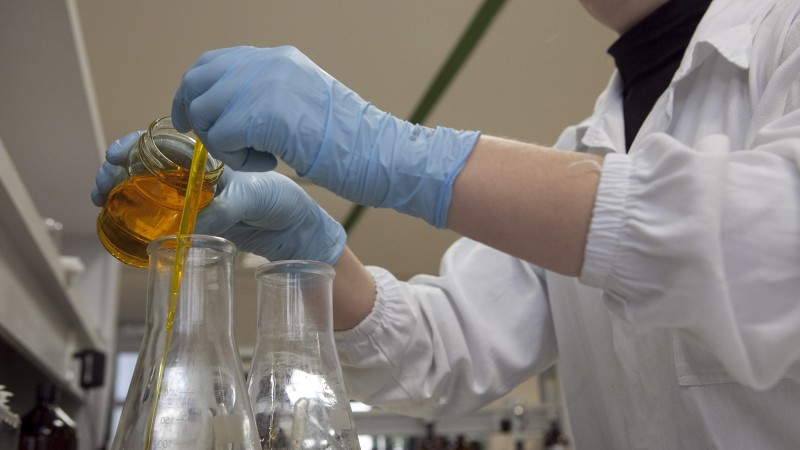Biofuels
Biofuel is a renewable energy source that partially or totally replaces fossil fuels in the form of biodiesel, hydrated or anhydrous ethanol, biogas and biomethane. Biofuels account for a significant share of the Brazilian energy matrix, characterized by the diversity and significant participation of renewable sources. The use and integration of biofuels into the productive sectors of Brazil and Rio Grande do Sul contribute to the reduction of greenhouse gases and provide more opportunities for income, employment and technological development.
Brazil has become a reference in biofuel production with the implementation of programs targeted to the promotion of biofuels associated with research and technological advances. Biodiesel, derived from vegetable or animal fats, is used in compression-ignition engines (Diesel cycle). Soybean oil is the main raw material for biodiesel production in Brazil. The pioneering initiative of producing ethanol, hydrated or anhydrous, as a substitute for gasoline, was stimulated. In 2016, the biodiesel and ethanol consumed in the country to replace fossil fuels kept 64.3 million tons of CO2 from entering the atmosphere (MtCO2) (EPE).
It is estimated that the biofuel industry manages one million direct jobs and two million indirect jobs over 1,600 Brazilian municipalities, impelling the regional development. The sector contributes approximately US 150 billion to the Gross Domestic Product (GDP) (MME).
The Renovabio Program has been recently launched to expand biofuel production in Brazil and promote the conditions necessary to ensure compliance with the commitments made during COP21. Therefore, in addition to ethanol and biodiesel, new biofuels such as cellulosic ethanol, bio-kerosene, biogas and biomethane will also be promoted.
The institutions responsible for energy planning operations in Brazil are focused on the expansion of biofuels to reduce carbon dioxide emissions in electricity generation in the country. The PDE predicts investments of R$ 24 billion for the expansion of ethanol in the 2016-2026 period, based on a projection of growth in demand of 3.8% per year, reaching 44 billion liters. Regarding biodiesel, a 6.5% increase in supply is expected for the referred period and a fast growing demand reaching 7.7 billion liters per year.
Rio Grande do Sul, as Brazil’s largest producer of biodiesel, with the largest installed capacity in the country and a consolidated industrial park, will play a key role in the rise in biofuel supply.
Biodiesel has been introduced very recently into the Brazilian energy matrix, through the creation of the National Program for the Production and Use of Biofuel, which instituted the mandatory addition of a minimum percentage of biodiesel into diesel sold to consumers in Brazil. In 2008, a minimum percentage of 2% of biodiesel addition was mandatory. These percentages were gradually increased, reaching 7% in 2016.
The percentage of biodiesel addition will reach 10%, in 2019, and is expected to reach 20% in 2030. According to a study by relevant organizations Abiove, Aprobio and Ubrabio, the 20% percentage of biodiesel addition to diesel in 2030 will increase production to 18 billion liters/year, with an estimated annual growth of 3.9% and the constitution of 48 new plants. This fast rise in biodiesel supply will require the expansion of investments in research, technological and logistic development, as well as the diversification of raw materials, in order to increase productivity and lower consumer prices.
Brazil ranks second in biofuel production in the world after the United States and is followed by Germany and Argentina. With 50 plants approved by the National Petroleum Agency (ANP), in 2016, 3.8 billion liters of biodiesel (EPE) were produced in the country. Soybean oil is the main raw material used, accounting for 76% of biodiesel production, followed by bovine fat (15%) (EPE).
Rio Grande do Sul is the largest Brazilian producer of biodiesel and one of the pioneer states in its development. It has nine plants with operations approved and an installed capacity of 5,833 m³ per day, accounting for 28.5% of Brazil’s installed capacity. These plants produced 1,114,307 m³ of biodiesel. The State still hosts three of the four largest plants, with a daily capacity of more than 700 m³ (ANP, January/2017).
The development of biofuels in Rio Grande do Sul is favored by the availability of raw material and an installed productive base that counts on a local network of suppliers in the metal-mechanic, electro-electronic, automation, machines and industrial equipment segments, as well as a well-developed agroindustry.
Sector Opportunities
 Research and technological development to increase productivity and the diversification of crops to be used as raw material in biodiesel production.
Research and technological development to increase productivity and the diversification of crops to be used as raw material in biodiesel production.- Increase in the number of plants due to the gradual increase in the percentage of biodiesel added to diesel.
- Projection of increase in the demand for biodiesel in the 2016-2026 period, from 4 billion liters/year to 7.7 billion liters/year and variation in supply of 6.5%, in the same period (EPE, PDE 2026).
Business opportunities for partnerships
Look for local opportunities.
